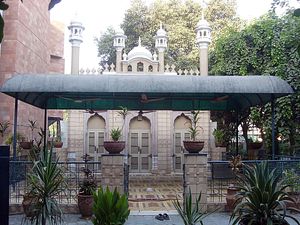On Monday, a mob of more than 1,000 Muslims attacked a mosque belonging to the Ahmadiyya Muslim community in Chakwal, a district around 150 km from the capital Islamabad. The mob opened fire, hurled stones, and set parts of the building ablaze in an attempt to take over the mosque. The attack came on Eid Milad-un-Nabi, the Islamic festival to commemorate the birth of Prophet Muhammad, with the religiously motivated mob desecrating the mosque as a “tribute” to the Prophet.
The Ahmadiyya community is accused of heresy by orthodox Muslim clergy owing to allegations of divergence from conventional Islamic beliefs. This led to the excommunication of the community in 1974 through the Second Amendment to Pakistan’s Constitution. In 1984, the government of Pakistan’s Ordinance XX barred the community from preaching their beliefs or using Islamic titles in their literature, epithets, or”‘places of worship.” According to the ordinance, an Ahmadi could be imprisoned for up to three years for “posing as a Muslim.”
The Chakwal “place of worship,” not acknowledged as a mosque by orthodox Muslims or the Pakistani state, was targeted over claims that the Ahmadiyya community had “taken over a mosque” and transformed it into their own worship place.
Even so, property disputes are used as a pretext to target the Ahmadis, with allegations of blasphemy and apostasy escalating amidst celebrations of Eid Milad-un-Nabi. This is why the Ahmadiyya community had requested the local law enforcement agencies to provide security for the Chakwal mosque, anticipating aggression.
The Chakwal attack came a week after Prime Minister Nawaz Sharif decided to rename a physics center in the capital after Dr. Abdus Salam, the first Muslim Nobel laureate, whose achievements have been discarded by the state owing to his Ahmadi identity. A day after the “Professor Abdus Salam Center for Physics” was announced, Punjab’s Counter Terrorism Department (CTD) raided the Ahmadiyya headquarters, and detained four Ahmadis affiliated with publishing the community’s magazines.
Targeting Ahmadiyya literature, as a “counterterror” maneuver or clampdown against “hate speech,” is a regular occurrence. But after the recognition for Dr. Salam, the authorities possibly felt the need to appease Islamist hardliners, who eventually took matters into their hands in Chakwal.
As Pakistan battles jihadism on multiple fronts, the Ahmadiyya question remains central to the state’s counterterror efforts. This is because all efforts to recognize the community’s contributions for Pakistan, or to safeguard their rights as citizens, remain subordinated by the Constitution’s codification of the Ahmadiyya community’s excommunication. Not only does this give Islamists the license to target the Ahmadis at will, it reaffirms the Sunni Muslim supremacy in Pakistan, which in turn sidelines other religious communities, including various Islamic sects.
A couple of weeks ago Masroor Jhangvi, a leader of the banned anti-Shia jihadist group Sipah-e-Sahaba Pakistan (SSP), was elected to the Punjab parliament. Jhangvi and SSP vociferously call for the genocide of the Shia Muslims in Pakistan, and former Sipah-e-Sahaba parliamentarians have proposed bills to apostatize the Shias along the lines of the Ahmadiyya excommunication.
When the state succumbs to declaring one Islamic sect heretics over ideological differences, it inadvertently sets a chain reaction in motion, maintaining the status quo of the narrowest brand of Islam.
According to Article 18 of the UN Declaration of Human Rights, to which Pakistan is a signatory, “Everyone has the right to freedom of thought, conscience, and religion; this right includes freedom to change his religion or belief, and freedom, either alone or in community with others and in public or private, to manifest his religion or belief in teaching, practice, worship and observance.”
Pakistan denying the Ahmadis their right to self-identify as Muslims is a blatant breach of the UN stipulations, which has been condemned by global rights groups and other states.
The ostensibly unanimous view of Muslim clerics to exclude Ahmadis from Islam is often cited as the rationale for apostatizing the community, even by those sections that might call for their rights as individuals to be protected. Not only does this line of argument put fundamental human rights – including the right to self-identify – at the mercy of others’ opinion, it gives credence to Islamists’ verdicts on blasphemy and the glorification of jihadists. This also gives Islamist hardliners a say over the rights of other marginalized sections of the society, including women, members of the LGBTQI community, or freethinkers.
Takfir, the act of declaring an individual or a group outside the fold of Islam, is the founding principle of jihadism. This is why most of the victims of jihadist terror are Muslims who are deemed not Muslim enough. As long as the Pakistani Constitution indulges in takfir, the state can never claim to challenge jihadist ideology. Pakistan’s fight against terror, therefore, hinges on the state accepting Ahmadis as Muslims.

































